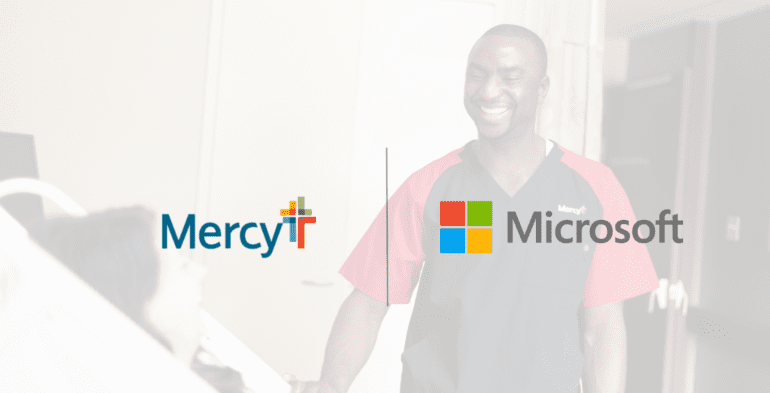TL;DR:
- Microsoft and Mercy are partnering to enhance patient care using generative AI and digital technologies.
- The collaboration aims to give healthcare providers more time for patient care and improve the overall patient experience.
- Generative AI will assist patients in understanding lab results and facilitate informed discussions with providers.
- AI will be used for streamlining patient calls and recommending follow-up actions, reducing the need for multiple interactions.
- Mercy’s co-workers will benefit from a chatbot for quick access to information about policies, procedures, and HR-related queries.
- The collaboration will launch over four dozen AI use cases for predictive, proactive, and personalized care.
- Microsoft’s technology will centralize and organize data, improving efficiency and connectivity.
- This partnership redefines healthcare by combining tradition with cutting-edge technology.
Main AI News:
In a groundbreaking synergy poised to redefine the healthcare landscape, Microsoft Corp. and Mercy are ushering in a new era of patient care with the formidable power of generative AI and digital technologies. This collaborative effort is poised to provide physicians, advanced practice providers, and nurses with an invaluable gift – time, enabling them to enhance the overall patient experience. This venture signifies the next frontier in healthcare, where cutting-edge digital technologies are harnessed to revolutionize the delivery of care to consumers.
“At this pivotal moment, as we witness the latest strides in generative AI, a profound shift is unfolding. These emerging capabilities hold the potential to help healthcare organizations tackle their most pressing challenges, ushering in much-needed efficiency and transformative care,” asserts Peter Lee, Corporate Vice President of Research and Incubations at Microsoft. “Mercy has been a stalwart in innovation, and our longstanding collaboration has culminated in the creation of an intelligent data platform, setting the stage for this transformative journey. It’s just the beginning, and Mercy’s adoption of these tools to empower clinicians in enhancing patient care is truly inspiring.“
Mercy’s strategy leverages Microsoft Azure OpenAI Service to institute immediate improvements in care through several innovative channels:
- Empowering Patients with Knowledge: Patients will now have access to comprehensive information to better understand their lab results. Thanks to generative AI-assisted communication, they can engage in informed discussions about their health with their healthcare provider. Patients will be empowered to seek answers in plain, conversational language, fostering a deeper connection with their care.
- Seamless Scheduling through AI: Mercy will employ generative AI to streamline patient calls for tasks like scheduling appointments. Beyond the initial call, the AI solution will provide recommendations for additional follow-up actions, ensuring all patient needs are met in a single interaction. This will significantly reduce the need for follow-up calls, optimizing the healthcare experience.
- Enhanced Internal Support: A dedicated chatbot for Mercy’s co-workers will expedite the retrieval of crucial information related to Mercy’s policies and procedures, as well as HR-related queries such as benefits and leave requirements. By enabling nurses and co-workers to access information swiftly, valuable time can be redirected towards patient care.
As Joe Kelly, Mercy’s Executive Vice President of Transformation and Business Development Officer, emphasizes, “Our substantial investments in collaboration with Microsoft, including the utilization of Microsoft’s secure cloud, position us for real-time clinical decision-making that ultimately enhances patient care.” This dynamic partnership envisions over four dozen AI use cases to be launched by the middle of the next year, promising predictive, proactive, and personalized care.
The Microsoft Cloud stands as Mercy’s preferred platform for continuous innovation, providing a secure and comprehensive foundation to drive efficiency, data connectivity, and transformative experiences for patients and co-workers alike. By centralizing and organizing data through an AI-powered intelligent platform on Azure, Mercy is uniquely equipped to swiftly adapt to evolving clinician and patient expectations.
Furthermore, Microsoft’s modern work solutions will elevate productivity and communication among Mercy’s co-workers, allowing them to allocate more time towards elevating the quality of patient care and the overall healthcare experience.
Steve Mackin, Mercy’s President and CEO, underscores the vision shared by both organizations: “Mercy and Microsoft are charting a new course for health systems, where we stand side by side, combining our centuries-old healthcare legacy with Microsoft’s unparalleled expertise in cloud and AI. Together, we aim to enhance care for our patients and enrich the work experience for our physicians, advanced providers, nurses, and co-workers. By harnessing technology securely and innovatively, we are redefining healthcare for all.“
The recent collaboration saw Mercy’s engineering teams and senior leaders converge with Microsoft’s leaders, engineers, and industry experts in a hackathon, a testament to their commitment to co-create and innovate around the burgeoning field of generative AI. Looking ahead, Microsoft and Mercy are preparing to showcase Mercy’s solutions at the Microsoft Technology Center (MTC) in Chicago in 2024. This exhibition will offer a glimpse into transformative clinical experiences and provide a tantalizing preview of the healthcare landscape of the future, powered by Microsoft technology.
Conclusion:
The partnership between Microsoft and Mercy signifies a significant leap in healthcare innovation. By leveraging generative AI and digital technologies, the collaboration promises to enhance patient care, streamline processes, and set a precedent for the transformative power of technology in the healthcare market. This strategic move underscores the growing importance of AI in shaping the future of healthcare delivery and patient experience.

